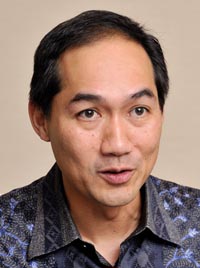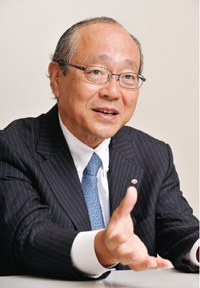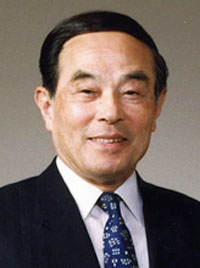
Having become one of the most important destinations of direct investment, the ASEAN market keeps growing. This year marks the 40th anniversary of friendship between ASEAN and Japan, and the two parties will surely continue to strengthen their connections. The ambassadors of Indonesia and the Philippines outlined ASEAN-Japan friendship.
Riding Indonesia's wave
The Association of Southeast Asian Nations (ASEAN) is now in "the second wave of industrialization" and Japan is riding on it, Indonesian Ambassador Muhammad Lutfi said.
 Indonesian Ambassador Muhammad Lutfi
Indonesian Ambassador Muhammad LutfiThe first wave was from the early 1980s to the late 1990s when the Asian currency crisis battered the ASEAN economy. During that period Japanese companies' investment sought competitiveness or cheap labor in the region to sell their products to the world. In the second wave, i.e., from 2011 on, Japanese companies are investing in ASEAN countries to seek new markets in the region, Lutfi said.
For instance, Japanese direct investment in Indonesia is growing rapidly in the last three years. When Lutfi took office in late 2010, it was $750 million a year and the first full year of his tenure saw it double to $1.5 billion and rise to $2.5 billion in the second full year, he said, adding the figure will continue to grow.
"ASEAN has the markets and needs technology. Japan has technology and needs the markets," he said.
In Indonesia, Japan's auto, steel and chemical industries are proactively investing. Japanese brands account for 95 percent of cars used in Indonesia, making Japanese carmakers the dominant players in the market, he said. The remaining 5 percent come from South Korea, Europe and other regions, and there are no Indonesian car brands.
Japanese investment will keep increasing as Toyota Motor Corp., Suzuki Motor Corp. and Daihatsu Motor Co. have recently said they will double investment in Indonesia by 2014. The automobile industry's investment is especially welcome because it lures direct investment from support industries, such as parts makers. There will be room for direct investments, including those of EMS, or electronics manufacturing services, to grow if electronics makers accelerate entry into Indonesia. EMS companies manufacture products of other companies' brands.
Asked what sector Indonesia aims to lure investment from, Lutfi said, "Any companies that are looking for a new market."
For example, diaper maker Unicharm Corp. spent $400 million for factories and sales offices in Indonesia, which had been relying on imports of Pampers. Indonesia is also the world's fourth most populous country and half of its population is under 30.
Asked the type of industry in Japan Indonesia wants investment from, Lutfi's answer was "the upstream industry," including processors of raw materials.
For example, oil refineries in Japan may want to invest in Indonesia because Japan has an oversupply of refineries, he said. Also, Indonesia has mines, such as copper, bauxite and iron, and can use Japanese technology.
ASEAN enjoys a prosperous and amicable relationship with Japan, and both sides also share the importance of the principle of the rule of law and peaceful resolution to conflicts, which is very important for peace, stability and prosperity in the region.
Especially, Indonesia regards Japan as a good friend. Lutfi pointed out a recent survey conducted in Australia asking Indonesians "Who is the best friend for Indonesia in the world?" and six out of 10 Indonesians answered Japan.
The same survey showed eight out of 10 Indonesians said Japan is the best business partner for Indonesia.
And the secret of the amicable bilateral relationship? "Indonesia and Japan share three basic values. They are democracy, the rule of law and the desire to solve conflicts peacefully," Lutfi said.

The root of Katolec Corp. is the marine logistics business it started in Takamatsu, Kagawa Prefecture, in 1877. A fter World War II , the company entered overland logistics and established its status in the logistics industry.

FEC , The International Friendship Exchange Council, was established in May 1983. Kanagawa has served as chairman since 2001, when he was then president of Shin-Etsu C hemical. A t that time, he was extremely busy, but accepted the post because he "sympathized with the philosophy of FEC ."
